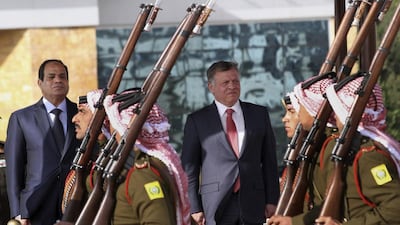NEW YORK // The US spending bill for 2015 that is likely to be passed this week restores the US secretary of state’s power to waive conditions placed on Washington’s nearly $1.5 billion in economic and military aid to Egypt.
The budget passed by Congress after former president Mohammed Morsi was ousted by the Egyptian military in mid-2013 included conditions that the administration was not allowed to waive. This led to a partial suspension of the annual aid that Egypt’s military considers the bedrock of its relationship with the US.
The suspension of aid and withholding of weapons systems that had already been paid for, including F-16 fighter jets, angered the military and was another factor in the deterioration of bilateral relations over the past 18-months. Those relations are now expected to normalise with the new framework for US assistance.
The deep ambivalence among members of both parties and in the Obama administration about the Egyptian government’s crackdown on the Muslim Brotherhood and liberal pro-democracy activists that led to the conditions on 2014 aid appears to have been superseded by immediate fears of regional instability and the US-led fight against ISIL, both areas where Egypt’s role is seen as important.
Andrew Hammond, a Middle East analyst at the European Council on Foreign Relations, said that western governments have moved in a direction “towards normalisation with the new Egyptian government.”
The election of former military chief Abdel Fattah El Sisi to the presidency and the rise of ISIL were key factors in convincing Washington to rethink withholding the aid.
“There is an incentive towards bolstering the Egyptian government and seeing them as an ally against this group,” Mr Hammond said.
The inclusion of waiver powers in the budget bill reportedly follows lobbying by Washington’s long-time allies in the region, including the UAE and Saudi Arabia, who see Egypt under Mr El Sisi as staunch opponent of Islamist militancy.
The US defence industry also likely pushed for a resumption of military aid, as financing from the money earmarked for weapons systems ordered by Egypt was said to be running out.
The 2015 spending bill reduces economic assistance from $200 to $150 million, with $1.3 billion appropriated for military and counter-terrorism.
The bill expands in scope and detail the nominal conditions that Egypt must meet in order for the aid to be disbursed. In order for the first $726 million tranche of aid not related to counter-terrorism operations in the Sinai or military training — which the law exempts from any condition — to be delivered, Mr Kerry must certify that Egypt has met a number of conditions.
These include the holding of free and fair parliamentary elections, that Egypt is implementing reforms that protect the freedom of expression and the rights of civil society organisations, and the release of US citizens held in Egyptian prisons that the secretary of state determines to be political prisoners.
The remaining $726 million would be disbursed when Mr Kerry certifies that these conditions are being met.
The long list of conditions, however, remain theoretical and included only as an attempt to mollify critics in Washington, and can be brushed aside by a national security waiver if Mr Kerry justifies such action to Congress. The bill allows for the justification to be given in a “classified form” without being made public.
With the Republican takeover of congress next year, the Democratic senator Patrick Leahy, who had been a key critic of US aid to Egypt and had blocked the delivery of Apache helicopters to the Egyptian military, will be stepping down from his position as the chairman of the Senate Appropriations subcommittee on State, Foreign Operations, and Related Programs.
The Obama administration remains divided about how forcefully to push concerns about the democratic transition in Egypt. The rise of ISIL over the summer had already caused Washington to try and get the bilateral relationship on a more solid footing. In June, Mr Kerry certified that Egypt was meeting its obligations as a strategic partner, and released $575 in military aid. A certification that Mr El Sisi’s government was taking steps to govern democratically was not given, even after the presidential election.
Congress also appears to support Mr Obama’s pledge to increase assistance to another ally that is more crucial to the fight against ISIL, Jordan. Following White House talks with Jordan’s King Abdullah II last week, Mr Obama said the US would increase aid to Jordan from $660 to $1 billion annually over the next three years. The new spending bill would ensure that Jordan receives “not less than” $1 billion in 2015.
tkhan@thenational.ae

